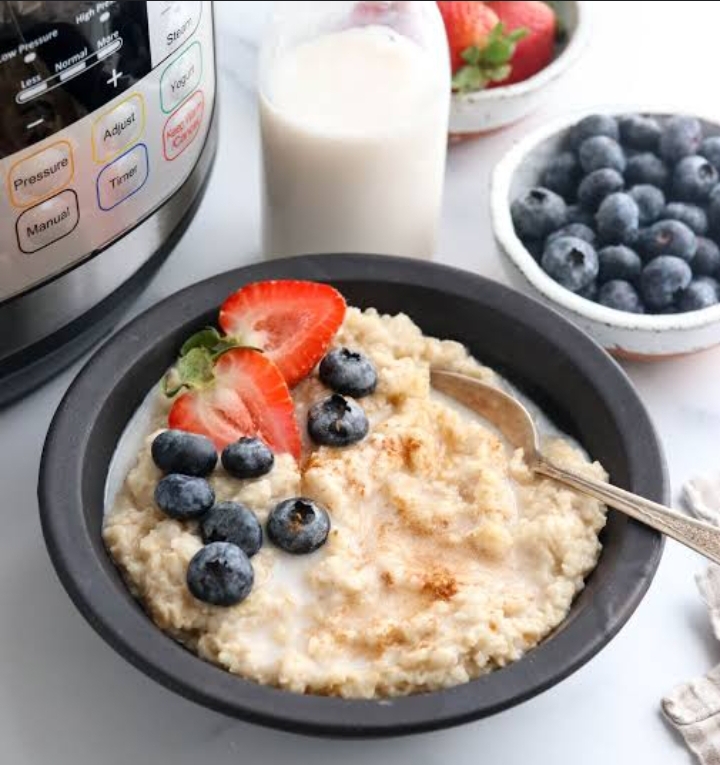Oatmeal is a good source of fibre and other numerous nutrients like protein, vitamins, minerals and phytochemicals compared to other cereals e.g.phenolic compounds
It has many health benefits and may help prevent certain health conditions.
History Of Oat
Oat, Avena Sativa, as it is scientifically called is a type of cereal grain from the Ponceae grass family of plants. Avena Sativa. Oats are primarily cultivated for livestock feed. Oats were cultivated in ancient China as far back as 7000 B.C but the ancient Greeks were the first to eat oatmeal as the porridge type cereal we know today.

What Is Oatmeal?
According to Wikipedia, oatmeal is a preparation of oats that have been de-husked and flattened or a coarse floor of hulled oat grains (groats) that have either been ground, rolled or steel cut. There are varieties of oatmeal. Examples are raw oats, steel cut oats, scottish oats, to mention a few. Consumption of oatmeal yields numerous amounts of health benefits. It helps in improving heart health, it lowers blood sugar levels, it reduces risk of cancer, it is good for the skin, it improves quality of sleep, it reduces hypertension and stress and it is also good for our digestive system.

Below are 6 Amazing Benefits of Oatmeals;
1. Heart-Healthy Superfood:
A significant body of evidence demonstrates that consumption of oat product is linked to reduction in the serum LDL cholesterol, a risk factor for the development of Heart diseases. Oats are a source of soluble fibre in the form of Beta-glucan. Consumption of Beta-glucan reduces serum cholesterol.
In corroboration, the weight of evidence in support of the beneficial role of oat through Beta-glucan led the US Food and Drug Administration (FDA) to authorize the use of health claims on oat products in 1997.
According to Dr. Chan, there is good scientific consumption that shows oat is generally helpful in lowering blood cholesterol. Dr Chan went further to talk about the role Beta-glucan plays in it and also implores people with high LDL cholesterol issues to start taking the grain;
Following the US authorization of it, The European Commission also gave the their approval on it . The first study to reveal that oat consumption reduced cholesterol goes back to 1963. By enriching bread with rolled oats, the authors observed an 11% reduction in total cholesterol levels. Beta-glucan is the most important bioactive component that lowers cholesterol levels and supports the defense system of the body to prevent infections.
2. Fuel for the day
Oats intake plays a vital role in digestion, especially to diabetic patients. Oatmeal is a complex carb which means it has oodles of fibre and it is more slowly digested than other refined carbs. Dietary fibre helps to slow down the breakdown of sugar in the body. This helps to prevent spikes in blood glucose and insulin levels.
Moreover, eating fibre-rich foods like oatmeal throughout the day makes it easier for people with diabetes to keep their blood stable. America Diabetes Foundation says a serving of oat meal adds 8g of fibre to the diet making it much easier to dietary recommendations.
As you know, a healthy gut decreases the risk for disease and inflammation. Oatmeal is good for your guts. The Beta-glucan in oat helps feed the good bacteria which results in keeping you full for hours by slowing down digestion and contributes to keeping the bowel movements regular.
3. Weight Management Ally
Oats as a good source of protein at 11-17% of dry weight (10.7g). The major protein in oats- at 80% of the total content is avenalin. Oats are low in calories and high in fibre. It contains other nutrients among which is protein, making them an excellent addition to an effective weight loss diet.
Popularly, the onset of obesity has been greatly associated with the appetite-regulating hormones that control, regulate and suppress hunger, satiety and energy expenditure.
Many observational and clinical studies prove that oats have a positive effect on anthropometric measures like BMI ( Body Mass Index), waist circumference, waist-to-hip ratio, lipid profile, total cholesterol, weight appetite and blood pressure.
Furthermore, many studies support the concept that oats are rich in protein, fibre, healthy fats, iron (Fe), zinc (Zn), magnesium (Mg), free phenolics, avenanthramides and many more. Several clinical studies supported oat utilization against obesity, appetite hormones, and energy regulation.
4. Skin Saviour
It’s no coincidence that oats can be found in numerous skin care products. Skin care industries often label finely ground oats as “colloidal oatmeal”. The FDA approved colloidal oatmeal as a skin protective substance back in 2003. But oats have a long history of use in the treatment of itch and irritation in various conditions.
Additionally, Oats are high in antioxidants and beneficial plant compounds called polyphenols. Most notable is a unique group of antioxidants called avenanthramide. Research has found that avenanthramide may help lower blood pressure levels by increasing the production of nitric oxide gas. Avenanthramide have anti-inflammatory and itching effects.
Keyshana, a YouTuber explains the the good benefits of oatmeal on your skin and the processes to get it done. She also she says it helps to clear eczema and retains moisture retention for people with dry skin;
5. Mood Booster
As we talked about in (2), fibre helps slow your digestion of carbs allowing for a gradual release of sugar which stabilizes your blood sugar levels and boosts your mood.
Also, oatmeal is attributed with stability of blood sugar levels, which is important for controlling mood swings and irritability.
6. Tummy Tamer:
Oatmeal also helps to reduce visceral fat, the fat that enables heart diseases and stroke.
Dr Kriste Smith, M.D talks about the importance of fibre in oats which makes defecation easier;
“Oats are loaded with soluble fibre, which is a type of fibre that allows more water to remain in the stool. This makes the stool softer and larger and ultimately easier to pass“
Dr Kriste Smith said
A natural remedy to improving your eating health and gut health. A solution to your skin itching and eczema problems. A constipation solving problems. A meal that helps in maintaining your ideal weight and reducing excess weight. Oatmeal, as we mentioned helps to reduce the risk of CVD problems. It is one of the best food you can eat for a healthy heart. Also helps to improve cognitive functions, most especially in older people.
In conclusion, Oatmeal has a lot of health benefits for you not to start incorporating it into your diet today.









